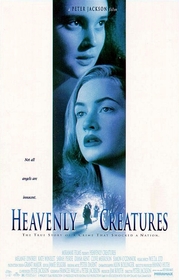Our editor-in-chief Nate Yapp is proud to have contributed to the new book Hidden Horror: A Celebration of 101 Underrated and Overlooked Fright Flicks, edited by Aaron Christensen. Another contributors include Anthony Timpone, B.J. Colangelo, Dave Alexander, Classic-Horror.com's own Robert C. Ring and John W. Bowen. Pick up a copy today from Amazon.com!
Heavenly Creatures (1994)
One of the most lively debates in the horror fandom is the most basic one: "What is horror?" Everybody has their own definition. For the most part, I take a pretty laidback attitude about it. Sometimes a film comes along, though, that really makes me sit up and delve into the subject.
Under most standard definitions, Heavenly Creatures is not a horror film. It bears some consideration, however, as to why this label has not been attached. Certainly, the film is not lacking in the disturbing department. It chills to the very morrow of the bone. However, it is the nature of the horrified reaction that is the reason you can find the film in your local Blockbuster's Drama section (if at all). The creeps come up on you subtly, sadly - because this is real, and the things that go bump in the night are the ones who you care about.
Heavenly Creatures is the true story of Pauline Rieper and Juliet Hulme, two outcast girls growing up in 1950s New Zealand. Their friendship is so strong that it isn't a friendship at all, but a soul-cohesion. Together, they create a huge, detailed fantasy world, full of colorful character and the standards of any good tale - blood and romance. They even take to calling each other by the names of their imagined counterparts. However, their deep affection for each other troubles their elders, who try to split the two up. Backed into a corner, they react in the most tragic way possible, forever changing the course of their destinies.
Peter Jackson, well-known for the bombast of his previous three pictures (Bad Taste, Meet the Feebles, and Dead Alive), makes a surprisingly quiet film here. It's a restraint that he has yet to show again, although I would certainly love to see some more of it. He is allowed his moments of over-the-top fancy (specifically the Fourth World fantasy sequences), but even these he refuses to give over to camp or comedy. If anything, they act as strong statements on the fine line between genius and madness, and the most clear indication of the girls' straddling of this boundary (see Pauline's first two quotes below).
Winslet, in her breakout role, is perfection. Her character seems to descended from a long line of flighty Audrey Hepburn socialites, with a touch of obsession lurking under her bright exterior. Never before has nonconformity been so appealing.
The real performance to watch, however, is Melanie Lynskey's interpretation of the dowdy Pauline. Hers is a character who has potential for great things, just lurking below the surface, who finally found the right person to bring her out - and she'll do anything to keep her new relationship. Although she comes out as the dependent of the two, it's obvious that she's also in control in many ways. It's a telling sign that Heavenly Creatures is framed by Pauline's diary entries.
What will probably leave you with an uncomfortable feeling in your stomach is how two wonderful and, yes, heavenly creatures can be so intermingled as to have their perspectives of everybody around them skewed. It's Them vs. the World, and there is no middle ground. Jackson makes it very clear that nobody is truly at fault - other than the values of the 1950s, perhaps. The final fates of all involved are undeserved and very sobering.
It's been said that Heavenly Creatures was Peter Jackson's calling card to Hollywood, the film that opened the door to his ultra-ambitious Lord of the Rings adaptation. It's with this film that the director's intelligence and depth of understanding first came gleaming out. Yes, it's a heart-rending drama, but it's also a chilling real-horror film and so much more. It is the single best film in Jackson's filmography, and a compliment to New Zealand cinema.








